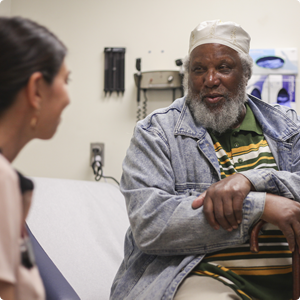
Formerly incarcerated individuals find success with California’s Transitions Clinic Network (TCN).
TCN clinics train community health workers to support the unique health and re-entry needs of the formerly incarcerated.
“Our goals are to support healthy and successful reintegration back into the community. We want to empower individuals to take an active part in addressing their re-entry and medical needs,” said a TCN health worker. “We also strive to provide meaningful employment for people with histories of incarceration, many of whom have been systematically excluded from jobs in the healthcare field.”
To better assist new members, an assessment was made with the Transitions Clinic Network by interviewing formerly incarcerated people to f ind out how they can be better served for their medical system needs, according to a TCN article.
“Many returning community members have a lot of chronic health conditions that need to be taken care of, but have questions about how to do it,” said one TCN community health worker (CHW).
TCN community health workers noted that people leaving prison with serious health issues [cancer, substance abuse and mental health conditions] could greatly benefit from their network of clinics that help those in need find housing, work and other necessities, and employ one formerly incarcerated CHW in every clinic.
The need for the program came to light when formerly incarcerated individuals who were scheduled to come to the program instead ended up in the Emergency Department. Collaboration with community members began and TCN was born, according to the article.
When asked what currently incarcerated people can do, David Durant, SUD Counselor/Case Manager for Hill Country Community Clinic and Community Health Worker, responded, “Assuming that this is related to accessing services through TCN, call the hotline. Get familiar with what is and is not available in the area you’re paroling to. Call and schedule an initial appointment even before you are released and see about getting your MediCal approved before release.”
The TCN program started in 2006 at the Southeast Health Center located in the Bayview Hunters Point neighborhood of San Francisco. Today it has 44 programs nationwide, with plans to have a medical home in every community in the U.S. that is affected by mass incarceration, the article noted.
The re-entry program “Is a call to action to all county health care systems and social services to address the glaring health disparities and social inequities facing the returning citizen [formerly Incarcerated],” said Re-entry Health Conductor Charleszetta Brown, of the African American Health Conductors Program, Contra Costa Health Services, in partnership with the Center for Human Development in Pittsburg, Ca.
With 21 programs in 14 California counties, TCN has served over 10,000 formerly incarcerated people.
In addition to housing and employment, TCN members help to obtain Medi-Cal insurance, help find and make medical appointments, and access medication refills. And for those men and women who want to learn how to use computers, email, or their new cell phone, TCN has a technology coach to help them do that.
New members get one-on-one help in creating a re-entry plan based on their individual health and re-entry needs, the article stated.
Research studies have shown that patients in TCN programs have better health and are less likely to make emergency room visits or become hospitalized.
“My advice to those who are incarcerated is the important thing to do is look for hope in your life. Hope is the key ingredient to change and hope is the medicine that will allow you to address your own trauma,” said Lead CHW Joe Calderon. “I challenge you to become part of the solution. I look forward to hearing you call our hotline or seeing you in person one day. Know this, we do this work because we care. We here in the community, we want to help, and we’re excited to welcome you home one day,” the formerly incarcerated Calderon concluded.
TCN would like anyone looking to make a successful re-entry into society after incarceration to make TCN a part of their re-entry plans.
“For me personally I feel like we are here to attempt to balance a scale. There are many obstacles waiting for those who transition home — purposefully crafted restrictions designed to hinder one’s success while simultaneously drawing attention to the fact one has a prior conviction [i.e., flashing neon sign, ‘”CONVICT HERE BEWARE!!!”’], said Durant. “We are seeking to turn that around and bring balance. We see the formerly incarcerated as sons and daughters of our community to be welcomed home, embraced, stood beside, encouraged and helped in their journey. The flashing neon sign is a signal for us to get in, get involved, and embrace the opportunity.
You can call the TCN Reentry Hotline at (510) 6066400 Monday – Friday, 9 a.m. to 5 p.m. PST, to talk to a formerly incarcerated TCN CHW. This number accepts collect calls from institutions that use Global-TelLink.

